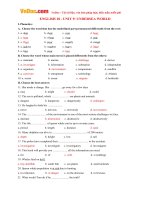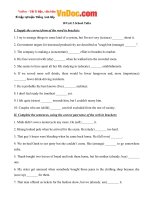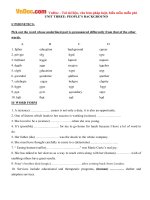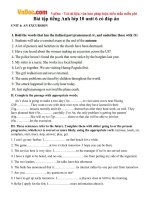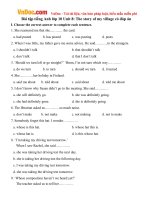bài tập tiếng anh lớp 10 unit 11
Bạn đang xem bản rút gọn của tài liệu. Xem và tải ngay bản đầy đủ của tài liệu tại đây (129.64 KB, 9 trang )
UNIT 11 - NATIONAL PARKS
I. Choose the word with the underlined 'letter pronounced different from the others.
1. a. nation b. tourist c. study d. return
2. a. world b. children c. grandfather d. dangerous
3. a. nature b. potential c. option d. pollution
4. a. handsome b. Wednesday c. dependent d. grandchild
5. a. castle b. fasten c. ballet d. intend
6. a. national b. question c. population d. station
II. Complete the sentences with the correct form of the verbs in the box.
locate establish orphan abandon contaminate
explore release defeat contain endanger
1 . There is a danger of serious …… from radioactive waste .
2. The giant panda is in danger of becoming extinct. It is an………… species
3. Cuc Phuong National Park is …… 160 km South West of Ha Noi
4. He wants how the human brain will function under these circumstances.
5. He has been ……… since he was five.
6. The enemy was ………… in a decisive battle.
7. His mother ………… him when he was five days old.
8. The board agreed ………… two committees to examine the proposals
9. Toxic gases from industrial factories were ……… the atmosphere.
10. Brown rice……….a lot of vitamins and minerals.
III. Complete the sentences with the correct form of the words in bracket.
1. didn't go into business with Sam. If I ……… (go) business With him, I (become) a success.
2. We got to the station in time to catch the train. If we (miss), it We (be) late for
the meeting.
3. Mary and I weren't able to go on a honeymoon We (can/ go) away if my father ……. (not get)
sick.
4. I took a taxi to the hotel but the traffic was very bad. It_ (walk). (be) quicker if I
(walk)
5. It's good that you reminded me about Ann's birthday. I (forget) if you ……… (not remind) me.
6. The view was wonderful. If I ………. (have) a camera, I …… _ (take) some photographs.
7. Unfortunately, I didn't have my address book with me when I was in New York. If I …… (have) your
address, I ……… (send) you a postcard.
8. We ………… (may/ be) at the airport for hours, if we ………_(not know) that the flight was delayed.
9. The accident was your fault: If you ……… (drive) more carefully, it ………… (not happen).
10. If you ………. (tell) me you needed money, ………. (can/ lend) you some.
IV. Write a sentence with if for each situation.
1. He didn't prepare for the interview, so he didn't get the job.
__________________________________________________________
2. We came home from our holiday early because we ran out of money.
__________________________________________________________
3. I can't take much exercise because I don't have enough free time.
__________________________________________________________
2. The house didn't burn down because the fire brigade came immediately.
__________________________________________________________
3. The men were wearing protective clothing, so they were all quite safe.
__________________________________________________________
4. People don't realise how important it is to conserve energy, so they do nothing about it.
__________________________________________________________
4. I took the job because I didn't know how difficult it was.
__________________________________________________________
8. My father didn't earn much money, so life wasn't easy for us.
__________________________________________________________
9. Daniel really wanted to buy the book, but he didn't have enough money.
__________________________________________________________
10. There isn't any truth in her allegations, so I won't resign.
__________________________________________________________
11. Andrew wanted to ask Frank Sinatra for his autograph, but he Wasn't brave enough
__________________________________________________________.
12. 1 don't know anything about plumbing, so I can't fix the leak in the sink myself
__________________________________________________________
V. Read the following newspaper report and use a suitable form of each verb in brackets.
Several phone cars were involved the pile-up because no one (1) (try) to phone the
police for help. If some(2) the police immediately, they (3) ………(be able) to send an
balance and also direct the traffic, thus (4) …… (prevent) other accidents. A passer-by (5) ……
(tell) police that he (6) ……… (decide) to free the trapped drivel: before (7) ……… (phone) the
police. He said that the trapped driver (8) ……… (beg) him not to leave him. If he (9) ………
(go oft) to look for a phone or to seek help, the driver (10) …… (be) in the car when it (10) ………
(hit) by the second car.
VI. If necessary, correct these sentences.
1. If Jack had been honest, he would return the money.
1. The video pauses if you press this button.
2. If she would have really wanted to see me, she would have come earlier.
3. If he doesn't break the window then who is responsible?
4. If Claire will continue to work hard, she should pass the exams easily.
5. Steve would have been attacked if I hadn't come along.
6. I'd be able to visit Jim first thing in the morning if I stay in Manchester overnight
7. Speak to Jane if you wanted to book a room.
8. If you know what it was going to be like, why did you come?
10. You'd be surprised if I told you how much this cost.
11. If I had suddenly announced that the holiday was cancelled, the children had objected.
12. We might soon be making a profit if all will go according to plan.
VII. Choose the best answers to complete these conversations.
1. 'It's pity the lake wasn't frozen yesterday.' `Yes, it is. if it _ froze we …… skating.
a. had been/ could have gone b. was/ could go
c. would be/would have gone d. would have been; had gone
2. 'Are you thinking about going to the Bahamas for the holidays?' `No, but I ……… the time, I would
definitely
a. have/ go b. had/ go
c. have had/ have gone d. would have/. have gone
3. There's always something going wrong with this car.' 'If you had any sense, you'd …… it long ago.'
a. be selling b. have sold c. sell d. sold
4. Was Pam seriously injured in the accident?' 'She broke her arm. It much worse if she hadn't
been wearin
g
her seat belt.
a. will be b. would have been c. was d. were
5 .My boss made me work overtime again.' `If I you. I my job.'
a. were/ would have quit b. am/ will quit
c. was/ must quit d. were/ Would quit
6 'Can I borrow your car for this evening?' 'Sure, but Nora's using it right now. If she ……… it back in
time, you welcome to borrow it.'
a. brou
g
ht/ will be b. would bring/ were
c. will bring/ are d. brings/ are
7. `Why didn't Bill get the promotion he was expecting?' `He may not be qualified. If he were,' he ……
that promotion last year.'
a. would have been given b. was given
c. would be given d. had been given
8. 'Why are you going mountain climbing next weekend?' 'To be honest with you, I'm lazy. If I , I
……… with you.'
a. hadn't been/ would have gone b. weren't/ would go
c. am not/ will go d. weren't/ go
9. 'Will you see Tom at lunch today? I'd like you to give him a message.' 'I'm not going to lunch, but if I
him later, I ………… him your message.'
a. should see/ will give b. see/ give
c. saw/ would give d. could see/ will give
10. 'John went to the hospital alone.' 'Did he? If he …… me, I ……… with him.'
a. told/ would go b. told/ might have gone
c. had told/ could god. had told/ would have gone
11. 'My car broke down when I was leaving Detroit'…………, we'd ……… you up.'
a. If we had known/ pick b. Had we known/ have picked
c. If we'd known/ picked d. If we knew/ pick
12. 'I don't know whether to take that job or not.' …… you, I ……… it.'
a. If I had been/ would have taken b. Should I be/ will take
c. if I were/ would d. Were I/ would take
13. 'You look tired. "Well, if you me up in middle of the night , I so tired.'
a. didn't wake/ wouldn't have been b. hadn't woken/ wouldn't be
c. hadn't woken/ wouldn't have been d. don't wake, won't be
14. 'Alice is moving to her new apartment next Saturday.' `I ……… glad help her ……… some help.'
a. will be! should she need b. am/ if she will need
c. must be/ if she needs d. would be/ had she needed
15. 'Why are you sitting in the dark?' `Let's just say that if I my electricity bill last month, I ………
in the dark now.'
a. paid/ wouldn't be b. paid/ won't be
c. had paid/ wouldn't have been d. had paid/ wouldn't be
VIII. Choose the correct preposition.
1. Tourists go to Cuc Phuong National Park to look at/ for the 1,000-year-old tree
2. He left school to take care of/ on his sick mother.
3. Do you belong in/ to any campus clubs or organizations?
4. Now that she has graduated, Anne is no longer dependent to/ upon her parents in/ for financial
support.
5. That man is an idiot. He pushed me- down/ into the swimming-pool.
6. Were you surprised at/ with the grade you received?
7. Unfortunately, the excursion turned out/ into to be a disaster.
8. Did you hear that news on/ in television or read it on/ in the newspaper':
9. Occupational physicians search on/ for the causes of injury and sickness the workplace.
8. Due on/ to a computer error, $100,000 was transferred to/ onto Judy's account.
10. They have to live in/
.
on a Social Security check of 5500 a month.
9. I'm always interested in/ on how to recognise the different
.
species of plants
IX. Choose the correct answers to complete this passage.
Mount Rainer, the heart of Mt. Rainier National Park, is the highest mountain in the state of
Washington and in the Cascade (1) ……… The mountain’s summit is broad and rounded. It is 14,410
feet (2) …… sea level and has an area of about one square mile. Numerous steam and gas jets occur (3)
……… the crater, but the volcano has been sleeping for many centuries.
Mount Rainer has a permanent ice cap and (4) …… snow fields, which give rise to more than forty
glaciers. These feed swift streams and tumbling waterfalls that race (5) ……… the glacial valleys.
Forests extend to 4,500 fee. There we alpine meadows between the ,glaciers and the forests, which (6)
………… beautiful wild flowers. The Nisqually Glacier is probably the ice region that most often (7)
………… by visitors. Paradise Valley, (8) ………. hotel accommodations are available, perches (9).
……… the mountains slope at 5,400 feet The Wonderland Trail encircles the mountain. (10) …………
90-mile length can be covered in about a week's time.
1. a. Range b. Parkc c. Mount d. Area
2. a. on b. above c. from d. over
3. a. on b. in c. through d. around
4. a. extend b. extended c. extensive d. extensible
5. a. to b. into c. through d. down
6. a. contain b. include c. combine d. cover
7. a. attracted b. traveled c. established d. explored
8. a. which b. where c. whose d. there
9. a. on b. at c. in d. along
10. a. It's b. This c. Their d. It
X. Read the passage careful, then choose True, False, or No Information.
The idea of national parks began in the US, which now has 54 of them, covering over 80,000
square-miles (200,000 square kilometers). The great majority are in western states. The National Park
Service is responsible for protecting the natural state of the parks for the benefit of the public. America's
parks are so popular that they are being harmed by the number of visitors and their cars. To try to stop
this, the National Paris Service announced in 1997, that people would only be able to visit some parks
using public transport.
The oldest national park in the world is Yellowstone National Park, established in 1872. The largest
US park is Wrangell-St Elias in Alaska with 13,000 square miles (34,000 square kilometers). It has few
visitors because it is very remote. The most popular park is the Great Smoky Mountains. Many parks are
well known for some special feature, such as the. Grand Canyon. the Ever
g
lades and the Petrified Forest.
1. There are 54 national parks in the United States.
a. True b. False c. No Information
2. The surface area of the US is over 80,000 square miles.
a. True b. False c. No Information
3. In the US, most of the national parks are located in the west.
a. True b. False c. No Information
4. National parks attract thousands of visitors each year.
a. True b. False c. No Information
5. There are a lot of visitors come to America's national parks.
a True b. False c. No Information
6. People are not allowed to drive in some parks.
a. True b. False c. No informatics.
7. Wrangell-St Elias in Alaska has few visitors because it's hard to find.
a. True b. False c. No Information
8. Yellowstone National Park is the first US national park.
a. True b. False c. No Information
9. Everglades National Park is a subtropical wilderness in the southeastern United States.
a. True b. False c. No Information
10. The natural state of the parks in the United States is protected the National Park Service.
a. True b. False c. No Information
TEST FOR UNIT 11
I. PRONUNCIATION
A. Choose the word that has the underlined part pronounced differently from the others.
1. a. nation b. cave c. locate d. park
2. a. explore b. tropical c. orphan d. transport
3. a. toxic . b. tourist c. feature d. threaten
4. a. established b. orphaned c. recognized d. endangered
5. a. threaten b. ethnic c. together d. southeast
B. Choose the word whose main stress is place differently from the others.
6. a. establish b. butterfly c. orphanage d. national
7. a. variety b. recognize c. contaminate d. abandoned
8. a. expensive b. tropical c. release d. survival
9. a. toxic b. ethnic c. explore d. threaten
10. a. polluted b. dangerous c. comfortable d. temperate
II. VOCABULARY AND EXPRESSION
Choose the word or phrase – a, b, c, or d - that best completes the sentence or substitutes for the
underlined word or phrase.
1. Of the six people in the plane when it crashed, only one
a. existed b. lived c. hurt d. survived
2. The cattle drank from a river polluted with toxic chemicals.
a. waste b. colorless c. odorless d. poisonous
3. The charity is totally' dependent money from the public.
a. from b. in c. upon d. with
4. When the wastes are poured into the atmosphere, the air becomes con taminated and unpleasant to
breathe.
a. dense b. dirty c. upon d. with
5. They were sent to a local …………. Right after their parents death.
a. orphanage b. hospital c. park d. prison
6. Cuc Phuong National Park is ……… 160 km South West of Ha Noi.
a. lied b. established c. abandoned d. located
7. Nearly 1,000 of the world's bird species are with extinction.
a. threatened b. endangered c. protected d. abandoned
8. Many people come to the national parks to see the work being done to protect endangered species.
a. plants or animals that may be dangerous to people
b. plants or animals that disappeared from the world
c. plants or animals that are about to die
d. plants or animals that may soon become extinct
9. Scientists are now researching new measures to prevent levels from rising.
a. pollute b. polluted c. polluting d. pollution
10. This park is the orphanage where lots of orphaned and abandoned animals are taken care of.
a. looked after b. involved in c. dealt with d. moved in
III. GRAMMAR AND STRUCTURE
A. Choose the word or phrase - a, b, c, or d - that best completes the sentence.
1. If the world's tropical forests continue to disappear at their present rate, many animal species
extinct.
a. became b. would have become c. will become d. would become
2……… resigned, we would have been forced to sack him.
a. Had he not b. Hadn't he c. He had not d. He not had
3. I won't lend you this money you' ……… promise to pay it back.
a. in case b. if c. otherwise d. unless
4. If you …… us about the bad. service, we'd have eaten there.
a. didn't tell b. wouldn't have told
c. hadn't told d. had told
5. Diana is a wonderful ballet dancer. She since she was four.
a. has been dancing b. has been danced.
c. has danced d. was danced
6. The door was locked ……….
a. five minutes ago by Ann b. with Ann five minutes ago
c. by Ann five minutes ago d. in five minutes ago by Ann
7. It would have been a much more serious accident fast at the time
a. was she driving b. she had driven
c. had she been driving d. if she drove
8. Do you think there would be less conflict in the world if all people …… the same language?
a. speak b. will speak c. spoke d. had spoken
9. The teacher was absent today, so class was canceled. If she absent again tomorrow, class
tomorrow, too.
a. is/ will cancel b. is/ will be canceled
c. was/ would be canceled d. was/ would cancel
6. Hundreds of Species of Hawaiian flowers have become extinct or rare……. extensive land
development.
a. now that b. due to c. because d. for
11. Mar
g
e's children are used to ……… after school every day. They don i have to walk home.
a. picking up b. being picked up c. be picked up. d. pick up
12. You'll l
a. be met by my uncle at
.
the airport. b. meet
.
at the airport by my uncle
c. being met by my uncle at the airport. d. be met at the airport by my uncle
13. If I wasn't working for an accounting firm, I ………. in a bank:
a. had worked b. will work
c. would have worked d. would be working
14. If you …… to my advice in the first place, you in this mess right now
a. listen! won't be b. listened/ wouldn't have been
c. will listened/ wouldn't be d. had listened/ wouldn't be 15 'Have you ever played
bridge?
15. Yes, we ……. all the time when I was in college.'
a. would have played b. had played
c. used to play d. have played
B. Identify the one underlined word or phrase
4
A, B. C or D - that must be changed for the sentence
to be correct.
1. The dentist said to brush three times a day and don't eat candy.
A B C D
2. Before the final decision is reached, the various possibilities should probably
A B
discussed by the whole team.
C D
3. If we leave now for our trip, we can drive half the distance before we stop having lunch.
A B C D
4. I've been studying French since I've started high school.
A B C D
5. We could have given you a lift if we'd know you were coming this way.
A
6. The car would survive the tornado, had it been parked on the other side of the road.
A B C D
7. Virgin Island National Park features an underwater' preserve with coral reefs and colorfully
A B C
tropical fish.
D
8. Among other reason, the Humane Society established to shelter animals, educate animal owners,
A C D
and influence legislation regarding the protection of animals.
D
9. The oceans contain many forms of life that has not yet been discovered.
A B C D
10. If Nick hadn't come along, I don't know what would happen.
A B C D
IV. SPEAKING
Choose the appropriate sentence to complete this conversation.,
Daniel: (1)……
Rachel: This looks all right. (2) ……
Emma Oh: I've forgotten the sausages. They're in the car.
Matthew: (3) ……
Emma Oh thanks, Matthew.
Vicky: (4) … It looks nicer over there.
Rachel : No, it's fine here.
Daniel: Yes, (5) ………
Emma: Would you like a sandwich,
Vicky? Vicky :(6)
Emma: (7) ………
Matthew: And here are the sausa
g
es. (8) ……
A. Will you have one, E. Would anyone like one?
B. Shall I get them? F. Let's sit here.
C. I'd love to, but I'm still full. G. it's better here, I think
D. Where should we have our picnic, then? H. We could sit by those trees.
V. READING COMPREHENSION
A. Choose the words or phrases that best complete this passage.
Cuc Phuong, the first national park in Viet Nam, was (1)_………. opened 1960. It (2) …… 160
kilometers south west of Ha Noi spanning. Ninh Binh, Hoa Binh and Thanh Hoa (3) …… Cuc Phuong
National Park (4) …… over 200 square kilometers of rainforest. It attracts (5) …… tourists and
scientists. In 2002, nearly 100,000 visitors (6) …… _their way to Cuc Phuong. Tourists come there to
study butterflies, visit caves, hike mountains and lo at the (7) ……. tree. Many come to see the work (8)
……. to protect (9) ……… species. According, to scientists, there are about 2,000 different species (10)
…… and 450 species of fauna in the park.
1. a. recently b. probably c. specially d. officially
2. a. locates b. located c. is located d. is locating
3. a: provinces b. towns c. districts d. cities
4. a. covers b. contains c. abandons d. controls
5. a. neither b. either c. both d. every
6. a. had b. made c. got d. lost
7. a. 1,000-year-old b. 1,000-years-old c. 1,000 year old d. 1,000 years
8. a. done b. to be done c. been done d. being done
9. a. dangerous b. wild c. rare d. endangered
3. a. trees b. flora c. vegetation d. flowers
B. Read the passage
In the United States and its territories alone, there are more than 40 national parks, varying
considerably in landscape and mood. Each park was chosen for its unique features, representative of a
particular region of the country. Everglades National Park, for example, at the southern tip of Florida. is a
huge subtropical swamp, which provides refuge for such unusual reptiles as the alligator and for thousands
of varieties of birds. including the graceful pink flamingo. In sharp contrast to the Everglades are the arid,
dusty parks of the West. Mesa Verde National Park in Colorado. for example, preserves the ruins of an
Indian civilization which 'flourished in the twelfth and thirteenth centuries. Today, tourists can wander
through the awesome cliff dwellings that the Indians carved out of the steep rock.
1. What is the main idea of the passage?
a. The large number of nation parks.
b. National parks as a wildlife refuge.
c. The diversity of the national parks.
d. The differences between Mesa Verde National Park and the Everglades.
2. National parks in the US ………
a. are a lost different from each other.
b. change a lot in landscape and mood.
c. are made more interesting.
d. are completely different from other parks in the world.
3. Everglades National Park is …………
a. in the south of the United States. B.home to alligators and many varieties of birds.
c. an area of land that is full of water. d.all are correct.
4. The word 'which' in line 9 refers to
a. Mesa Verde National Park. b. ruins. c. Indian d. civilization.
5. Which of the following statements is false?
a. Every national park in the US has its special features.
b. Everglades Park has a cold climate.
a. The ruins of an Indian civilization are bein
g
, preserved.
c. Some of the dwellings in Mesa Verde are accessible only by ladder.
VI. WRITING
Choose the sentence (a, b, c, or d) which is closest meaning to the sentence above.
1. Were it not for the money, this job wouldn't be worthwhile.
a. This job is not rewarding at all.
a. This job offers a poor salary.
b. Although the salary is poor, the job is worthwhile.
c. The only thing that makes this job worthwhile is the money.
2. If we don't protect wildlife now, there will be nothing left for future generate
a. Wildlife is being protected now in case there will be nothing left future generations.
b. There will be nothing left for the future generations unless we protect wildlife.
c. Only if we protect wildlife, there will be nothing left for the future generations
d. It's important to protect wildlife now or there will. be nothing left for the future generations.
3. If we had left any later, we would have missed the train.
a. We left too late to catch the train.
b. When we arrived, the train had already left.
c. We: missed the train because it was late.
d. We almost missed the train.
4. 'Why don't we go to Nam Cat Tien National Park?' he said.
a. He asked why we didn't go to Nam Cat Tien National Park.
b. He offered to go to Nam Cat Tien National Park.
c. He suggested going to Nam Cat Tien National
.
Park.
d. He advised us to go to Nam Cat Tien National Park. .
5. We are planning on spending the weekend in the country as long as weather stays fine.
a. We are spending the weekend in the country because of the fine weather
b. If the weather is fine, we'll spend our weekend in the country.
c. If the weather was fine, we would spend our weekend in the count
d. We won't spend the weekend in the country unless the weather is fine
6. I didn't have an umbrella with me, so I got wet.
a.If I had had an umbrella, I wouldn’t get wet. B.If I had an umbrella, I wouldn’t get wet.
c.If I had had an umbrella, I wouldn’t have got wet. d.If I have an umbrella, I won't get wet.





